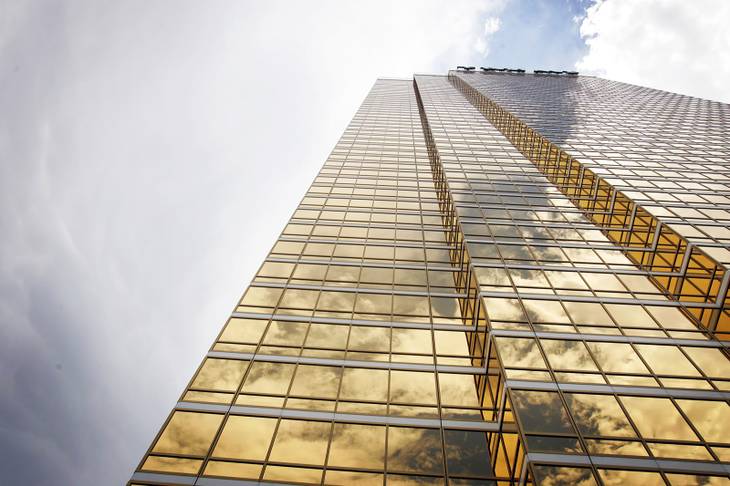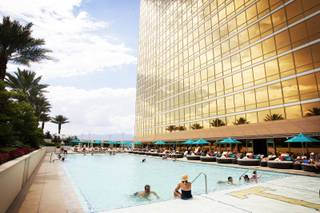A judge has rejected claims in a lawsuit filed by condominium purchasers who claim Donald Trump induced them into buying units at a Las Vegas tower at inflated prices.
U.S. District Judge Gloria Navarro in Las Vegas last week refused to overturn an arbitration decision in Trump’s favor in the dispute over whether the buyers could get out of purchase contracts -- and receive refunds of deposits -- after the real estate market cooled.
The case involved some 300 buyers in the 1,282-unit Trump International tower near the Las Vegas Strip.
In their federal lawsuit filed in January, the buyers sued Trump Ruffin Tower I LLC in hopes of overturning the arbitration award they said "manifestly disregarded applicable law and was irrational."
The buyers had put down deposits on the condos in 2005 and 2006, when the Las Vegas real estate market was booming.
"Trump took full advantage of that boom and aggressively spread the message that the units were in short supply and rapidly rising in price," the lawsuit charged. "Trump used that message to manufacture a purchasing frenzy in which potential purchasers believed they were in a now-or-never situation."
"Trump’s repeated claims that units were rapidly selling out was based on nothing more than non-binding reservation forms signed by prospective purchasers. Nor was there any increase in the value of the units, instead Trump simply manipulated market perceptions," the lawsuit charged, adding Trump’s claim that he would build a second tower due to booming demand never panned out.
After the real estate market cooled, the buyers in the lawsuit tried to cancel their purchase agreements and demanded return of their deposits. When Trump refused, the case went to arbitration.
In arbitration, the buyers claimed Trump had violated the Interstate Land Sales Full Disclosure Act (ISLA), which requires certain disclosures.
The suit alleged that Trump’s comments about the market for the condominiums are "precisely the kinds of unscrupulous practices, designed to manipulate potential purchasers into making uninformed purchases, that ISLA is intended to prevent."
That argument was disputed by attorneys for Trump, who wrote in a court brief: "In the wake of the crashing real estate market, plaintiffs hoped to rescind their investment in the Trump Hotel by relying on a purported violation" of the act.
Their claim, Trump attorneys wrote, was that Trump failed to include in the sales agreements certain wording about a buyer’s right to written notice of defaults by buyers and notices of 20 days to resolve such defaults.
"They assert this claim even though Trump informed plaintiffs of this unfettered right in a federally-mandated disclosure document provided before they signed their agreements and, in fact, Trump actually gave them written notice of every default and, in most cases, many more than 20 days to cure."
In the end, Navarro sided with Trump, noting in her order that the arbitrator had found the buyers had no right to revoke their purchase agreements because of specific language in the contracts and that Trump had substantially complied with the Interstate Land Sales Full Disclosure Act.
"The arbitrator thought that defendant could comply with the preeminent objective of the statute by providing the required disclosures in the property report – even though they were not in the actual purchase agreements – and by actually providing written notice of all defaults and 20 days to cure," Navarro wrote in her ruling. "Plaintiffs, on the other hand, essentially argue that the preeminent objective of the statue can only be complied with if a party complies perfectly with the words of the statute.
"Because there is no clear binding law on the issue, the court cannot conclude that defendant `manifestly disregarded’ the applicable law," she wrote. "Mere disagreement between the parties or between the court and the arbitrator over the arbitrator’s interpretation of the law do not warrant vacatur (voiding the arbitration award)."
Navarro also noted the arbitrator had based his ruling in part on the “absence of injury” and “lack of harm” to the buyers.
"This makes sense: although it does not necessarily follow from a lack of injury that defendant substantially complied with the statute, it does make it appear likelier that defendant substantially complied with the statute," Navarro wrote in her ruling.
A request for comment was placed with the plaintiffs’ attorneys.
Eric Trump, executive vice president of development and acquisitions at The Trump Organization in New York, on Tuesday said Navarro’s ruling should set a precedent in what he called numerous frivolous "buyers’ remorse" lawsuits and arbitration proceedings involving such developments in Las Vegas and elsewhere.
Defeating such legal challenges is important to developers, who use buyers’ deposits to help finance construction of projects like the Las Vegas Trump Tower condo-hotel.
"It’s an incredibly strong decision by a respected judge. I think it will have a crippling affect," on such actions, Trump said.


